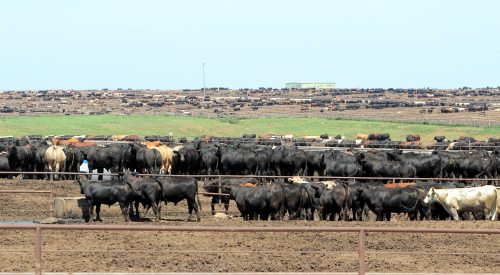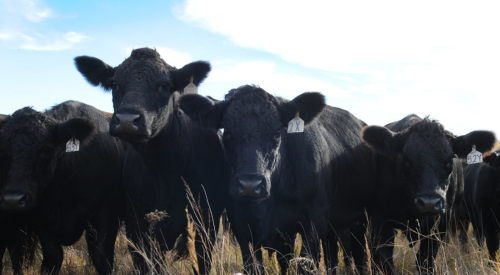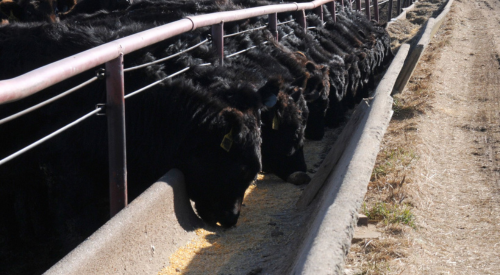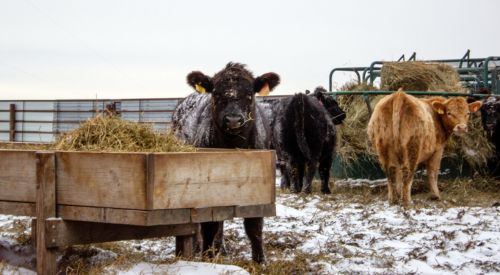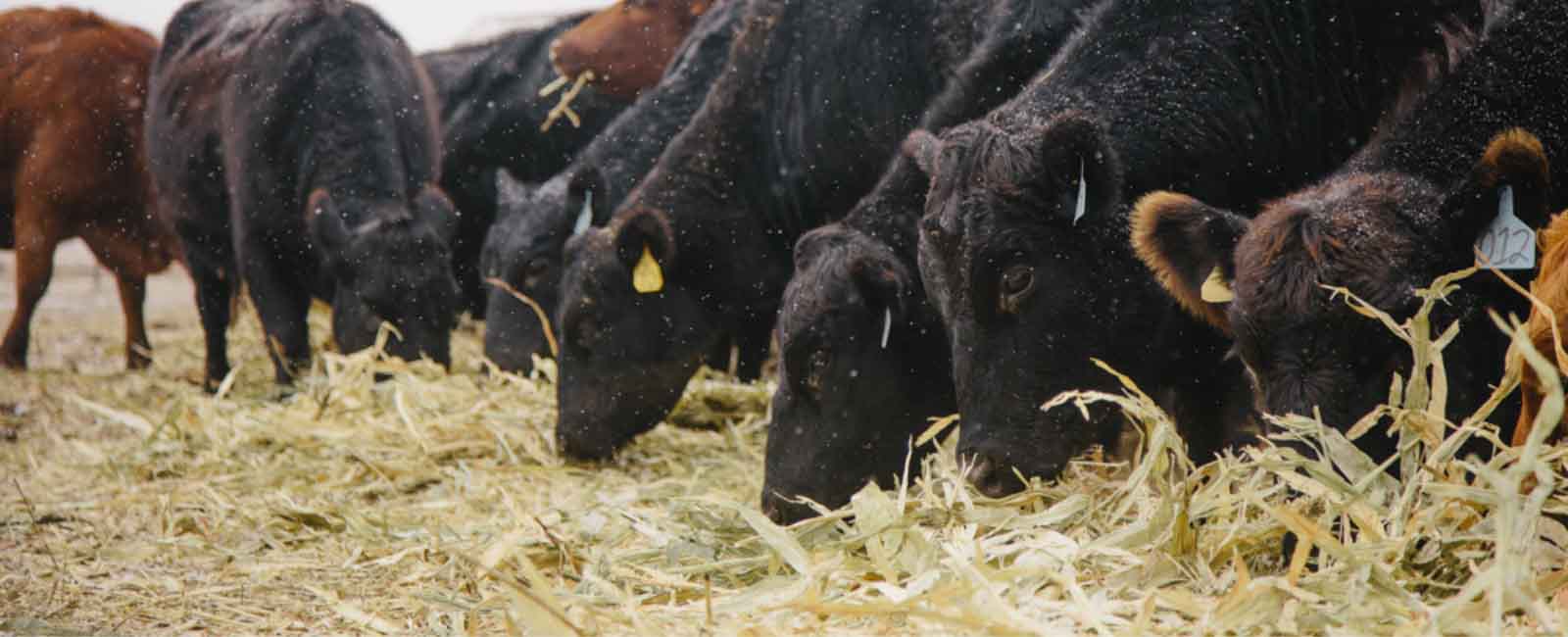
Beef Cattle Systems
Practical research in beef cattle systems
Over half of the 64,000 farms in Kansas raise cattle, with over 5.7 million head marketed annually. In 2003, cash receipts for all Kansas commodities was slightly over 9 billion dollars. Of this, approximately 62% of the total cash receipts in Kansas came from cattle and calves.
Nationally, Kansas ranks first in the number of cattle processed (approximately 8.2 million or about 23% of the U.S. total), second in fed cattle marketing (approximately 5.4 million or about 22% of the U.S. total), and seventh in beef cows (approximately 1.5 million or about 5% of the U.S. total).
Additionally, Kansas producers graze or background about 2.5 to 3.0 million stockers annually. Without question, beef production is the economic workhorse of Kansas agriculture.
Western Kansas Beef Cattle Systems Drought Resources
Discover our essential drought management resources for beef cattle systems, tailored for western Kansas cattlemen and women, and grounded in K-State research and quality extension programming. Click here to access expert strategies to sustain your herds during severe drought conditions.
Meet our Research and Extension Specialists
- Sandy Johnson, Professor / Beef Production Specialist and Founding Member of the Beef Reproduction Task Force
- Justin Waggoner, Professor / Beef Systems Specialist
- Keith Harmoney, Professor / Range and Forage Scientist
In the News
Grazing system that has benefited steers can boost cow-calf operations too
May 6, 2019
Researchers at the Kansas State University Agricultural Research Center in Hays have found that a grazing system shown to be beneficial for the performance of steers also has great potential for cow-calf producers.
Current Research Projects
Title: An Efficient Stocking Strategy for Grazing Replacement Heifers
Authors: Keith R. Harmoney and John R. Jaeger
Topic: Producers may be looking to increase production efficiency on a shrinking forage land base. The use of intensive early stocking (IES) is one of the most efficient stocking strategies to produce beef on rangeland acres. The IES strategy has been widely used in eastern Kansas and is capable of increasing beef production by 30–40% compared to continuous season-long stocking (SLS).
Title: Using Modified Intensive Early Stocking for Cow/Calf Production
Authors: Keith R. Harmoney and John R. Jaeger
Topic: A similar modified IES (MIES) system has increased production efficiency of stocker animals on western Kansas rangelands. Perennial grassland acres for cattle production, as well as cattle numbers, are declining. Using management practices that mimic the MIES system to increase beef cattle stocking density for breeding herds may allow producers to maintain or increase cow numbers for beef production on fewer perennial grassland resources. The objective of this project is to compare cow and calf growth and performance in traditional continuous season-long stocking (SLS) and MIES beef production systems. The objective of this research was to examine the effect of exercise four times daily for the first 14 days after arrival on the incidence of BRD and animal growth and performance.
Title: Effect of Exercise on Health and Performance by Long-Haul, High-Stress Steers During the Receiving Period
Authors: John R. Jaeger, Justin W. Waggoner, Keith R. Harmoney, and Quentin Rupp
Topic: Morbidity and mortality associated with the bovine respiratory disease (BRD) complex continue to be a significant challenge to the United States beef industry. Stress associated with maternal separation, environment change, transportation, diet changes, and commingling are common to beef industry marketing channels and have been linked to depressed growth and health of recently weaned calves.
Title: Kansas Land Values and Rental Rates (PDF)
Event: 2018 Roundup
Presenter: Mykel Taylor, KSU Agricultural Economics
Title: Using Intensive Early Stocking in Cow/Calf Production Systems (PDF)
Event: 2018 Roundup
Presenter: Keith Harmoney, KSU-ARCH Range Scientist
Title: Split-time Artificial Insemination Programs for Beef Cows (PDF)
Event: 2018 Roundup
Presenter: John Jaeger, KSU-ARCH Beef Cattle Scientist
Title: Beef Cattle Market Outlook Update (PDF)
Event: 2016 Roundup
Presenter: Glynn Tonsor, KSU Agricultural Economics
Title: Controlling honey locust trees on pasture (PDF)
Event: 2015 Roundup
Presenter: Keith Harmoney, WKARC Range Scientist
Title: Performance of replacement heifers supplemented with dried distillers grains or a mixture of soybean meal and ground sorghum grain (PDF)
Event: 2015 Roundup
Presenter: Carson McMullen, WKARC Graduate Student
Title: Effects of weaning method on finishing performance and carcass characteristics of early-weaned calves (PDF)
Event: 2015 Roundup
Presenter: Garrett Preedy, KSU ASI & WKARC Graduate Student
Title: Using estrus-detection patches to optimally time artificial insemination (AI) and improve pregnancy rates in suckled beef cows (PDF)
Event: 2015 Roundup
Presenter: Scott Hill, KSU ASI Graduate Student
Title: Effects of altering supplementation frequency during the prepartum period of beef cows grazing dormant native range (PDF)
Event: 2015 Roundup
Presenter: Carson McMullen, WKARC Graduate Student
Title: Using confined and limit feeding to expand the cowherd (PDF)
Event: 2015 Roundup
Presenter: John Jaeger, WKARC Beef Cattle Scientist
Title: Effect of early or conventional weaning and pasture or confined feeding on performance of calves and cows (PDF)
Event: 2015 Roundup
Presenter: Garrett Preedy, KSU ASI & WKARC Graduate Student
Title: Using wet distillers grains as a late season protein supplement for grazing steers (PDF)
Event: 2015 Roundup
Presenter: Keith Harmoney, WKARC Range Scientist
